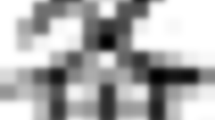Abstract
The main challenge in handwritten character recognition involves the development of a method that can generate descriptions of the handwritten objects in a short period of time. Due to its low computational requirement, fuzzy logic is probably the most efficient method available for on-line character recognition. The most tedious task associated with using fuzzy logic for online character recognition is the building of the rule-base that would describe the characters to be recognized. The problem is complicated as different people write the same character in complete different ways. This paper describes a method that can be used to generate a fuzzy value database that describes the characters written by different individuals.
Preview
Unable to display preview. Download preview PDF.
Similar content being viewed by others
References
Malaviya, A., Peters, L.: Extracting meaningful handwriting features with fuzzy aggregation method. In: International conference on document analysis and recognition, ICDAR 1995, Montreal, Canada, vol. 3, pp. 841–844 (1995)
Kartalopoulos, S.V.: Understanding Neural Networks and Fuzzy Logic, pp. 167–168. IEEE Press, Los Alamitos (1996)
Pal, S.K., Majumder, D.K.D.: Fuzzy mathematical approach to pattern recognition, New Delhi. A Halsted Press Book, Wiley & Sons, Chichester (1986)
Bandara, G.E.M.D.C., Pathirana, S.D., Ranawana, R.M.: A Short Method for On-line Alphanumeric Character Recognition’. In: NAFIPS – FLINT 2002, New Orleans, USA (June, 2002)
Bandara, G.E.M.D.C., Pathirana, S.D., Ranawana, R.M.: Use of Fuzzy Feature Descriptions to Recognize Handwritten Alphanumeric Characters. In: 1st Conference on Fuzzy Systems and Knowledge Discovery, Singapore (November, 2002)
Cheung, K., Yeung, D.: Bidirectional Deformable Matching with Application to Handwritten Character Extraction. IEEE Transactions on Pattern Analysis and Machine Intelligence 24(8) (August 2002)
Koerich, A.L., Leydier, Y.: A Hybrid Large Vocabulary Word Recognition System using Neural Networks with Hidden Markov Models. IWFHR (2002), http://citeseer.nj.nec.com/koerich02hybrid.html
Lee, S., Kim, Y.: A new type of recurrent neural network for handwritten character recognition. In: hird International Conference on Document Analysis and Recognition, vol. 1 (1995)
Kim, G., Kim, S.: Feature Selection Using Genetic Algorithms for Handwritten Character Recognition. In: Proceeding of the Sixth ACM SIGKDD International Conference on Knowledge Discovery and Data Mining (2002)
Author information
Authors and Affiliations
Editor information
Editors and Affiliations
Rights and permissions
Copyright information
© 2004 Springer-Verlag Berlin Heidelberg
About this paper
Cite this paper
Ranawana, R., Palade, V., Bandara, G.E.M.D.C. (2004). An Efficient Fuzzy Method for Handwritten Character Recognition. In: Negoita, M.G., Howlett, R.J., Jain, L.C. (eds) Knowledge-Based Intelligent Information and Engineering Systems. KES 2004. Lecture Notes in Computer Science(), vol 3214. Springer, Berlin, Heidelberg. https://doi.org/10.1007/978-3-540-30133-2_92
Download citation
DOI: https://doi.org/10.1007/978-3-540-30133-2_92
Publisher Name: Springer, Berlin, Heidelberg
Print ISBN: 978-3-540-23206-3
Online ISBN: 978-3-540-30133-2
eBook Packages: Springer Book Archive




